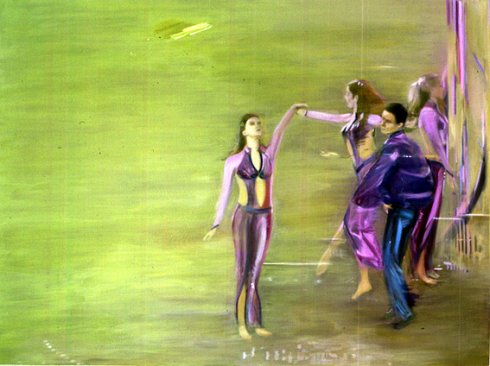12/7/2005
Group show
Union, London
Julia Schmidt's paintings have a fragmentary character where emptiness stands against visual beauty and opulence. Oliver Kossack's works are pictorial aphorisms. Julius Popp approaches scientific problems from an artistic perspective, in turn, achieving technically accomplished sculptures and installations. Rigo Schmidt's works can be described as finely worked paintings in small format.

New works by emerging German artists. Julia
Schmidt, Oliver Kossack, Julius Popp and Rigo Schmidt
Julia Schmidt's paintings have a fragmentary character where emptiness stands
against visual beauty and opulence. Combining art historical references with
that of glamour and fashion, her paintings shift between ascetism and
extravagance, and her careful focus on traces, details, omissions and shifting
thematic inter-relations, which organise her work in terms of cycles, or
groupings  clusters, consistently reverberate concerns with value and
artifice, use and ornament.
Oliver Kossack's works are pictorial aphorisms. He inhales his surroundings,
intuitively juxtaposing disparate elements with stereotypic references to (art
and cultural) history. Kossack plays with the multiple associative levels of
language, often seeking ostentatiously literal transcriptions in his drawings,
paintings and installations. Within this heterogeneous crossover of styles,
childlike drawings - seemingly naïve at first glance - operate as nasty
reflections of the everyday, while fetishlike, sculptural paintings refer to a
realm beyond the blatantly sexual or banally artistic. Kossack forces
self-understood utterances to coil back upon themselves. Characteristically,
taking the verbal (all too) literally his work functions as a catalyst of
experience within the dialectic of self and society, creating a quirky cosmos
of thought and image.
Julius Popp approaches scientific problems from an artistic perspective, in
turn, achieving technically accomplished sculptures and installations. In
collaboration with scientific institutes like the Fraunhofer Institut for
Autonomous Intelligent Systems he looks for scientific systems to give
expressions to his artistic thoughts. At UNION, Popp will exhibit Å’Bitfall',
which represents a sculptural information curtain  a waterfall made of
information. The installation is created by water formed letters, words, and
sentences. The information provided exists only for a certain period of time,
constantly being replaced by a continuous flow of new information,
representing an idea of reality that passes by.
Rigo Schmidt's works can be described as finely worked paintings in small
format. They appear as isolated object studies and show technical perfection.
Schmidt is inspired by scientific archives and exhibits, that are displayed in
natural history museums, or other already-once exposed objects that create the
foundation stone of culture and society. The exposed objects are stagnant and
taken away from their original context. Schmidt examines the constructed
scientific conception of the world and of history. Bringing these objects onto
canvas and converting them into paintings, Schmidt brings them back to life
and poses questions about issues of representation and a media-constructed
reality.
Julia Schmidt (b. 1976), Rigo Schmidt (b. 1974), Oliver Kossack (b. 1967) and
Julius Popp (b. 1973) live and work in Leipzig, Germany.
Recently, Julius Popp exhibited in the Biennale of Electronic Arts 2004,
Perth, Australia. Julia Schmidt is currently exhibiting in the 2nd Prague
Biennial of Contemporary Art, Prague and Oliver Kossack recently exhibited in
a solo show at B2, Leipzig, 2004. Currently, Rigo Schmidt is participating in
a group exhibition at Wohnmaschine, Berlin.
Texts by Tina Schulz and Mark Hamilton.
Next exhibition: New works by Roberta Silva September  November 2005
Union
57 Ewer Street - London
Opening Times: Mon-Fri 10am-6pm, Sat 12am-5pm



